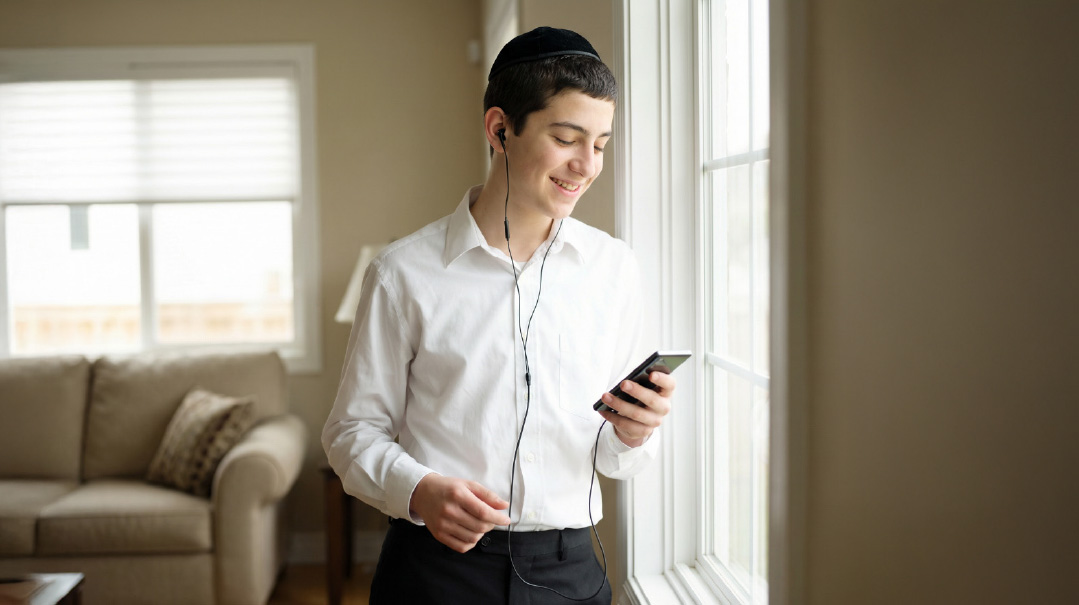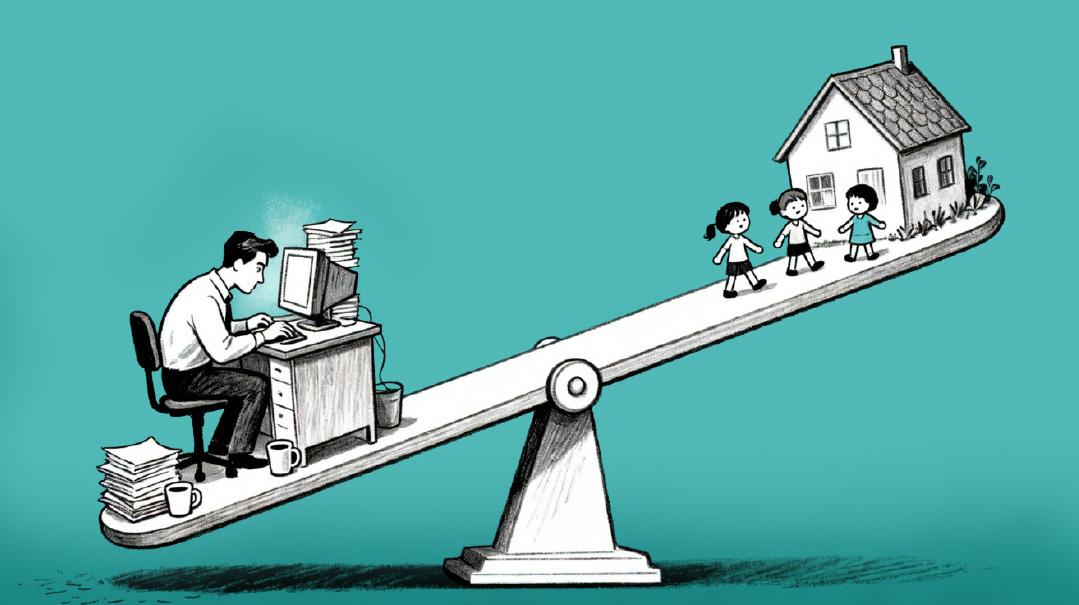Can I Get Your Attention, Please?

We are in the midst of an attention crisis, which we must understand and then urgently work out what we can do about it
I’M
writing this article because I’m worried. I’m worried about the people I see in my office and about what I hear from school menahalim. And I am worried about myself.
A few months ago, I was in Gateshead for a chasunah. Finding myself with some time to spare, I headed over to the famed Gateshead yeshivah, where I had learned as a bochur. As I walked through the hallowed hallways and sat down with my Gemara, I couldn’t help but notice how the beis medrash had barely changed in the twenty years since I left.
What had changed, I realized, was my ability to concentrate over my sefer, and this really disturbed me. How could it be that, when I was 17 years old, I could sit uninterrupted for a two-hour stint, but now I couldn’t manage much more than 30 minutes?
With my psychotherapist’s hat on, I wonder why so many of the people I see are struggling to focus and pay attention. And when it comes to the younger generation’s problems, well, the evidence is all too clear. One menahel told me his office has basically become a pharmacy, due to the huge amounts of medication now being prescribed to an avalanche of young people diagnosed with attention disorders. Children and adults are seeing their ability to pay attention in free-fall, with the inevitable devastating impact this will cause. We must first acknowledge that we are in the midst of an attention crisis, which we must understand and then urgently work out what we can do about it.
Let’s start with sleep, or, perhaps, the lack of it. The Western world is exhausted. In the US, 40 percent of the population is suffering from sleep deprivation, and in my own country, the UK, an incredible 23 percent is getting less than five hours a night. I can’t help but reflect on my own bedtime, which has become progressively later over the years.
Reduced sleep means we wake up unrefreshed, tired, and in desperate need of a coffee fix to keep our chronic drowsiness at bay. We all know that tiredness affects us emotionally, but it also severely hampers our ability to clear our minds and focus.
What’s interesting is that in many young people, tiredness causes irritability, a lack of emotional control; instead of lethargy, it actually causes hyperactivity, which can act as an ADHD type of disorder. (Research by Dr. Sandra Kooij, an associate professor of psychiatry at VU Medical Center in Amsterdam, attempts to demonstrate that lack of sleep could possibly be a cause for ADHD.)
Either way, it is beyond doubt that sleep deprivation is a primary cause for the number of children struggling to concentrate in school. Of course, these habits are very hard for them to fix if all they have ever seen is their parents and grandparents doing exactly the same.
Why do we find it so hard to hit the pillow and close our eyes at a regular time? Is it busy lives, or late-night screen time? Our society seems to admire those who burn the candle at both ends, workaholics who send emails at unearthly hours in the morning and who boast about the few hours of sleep they get.
When I was growing up, our neighbors would joke that you couldn’t call my house after 10 p.m. because my parents would be asleep. Actually, I think the joke is on me and everyone else who promise every morning, as we struggle to get out of bed, that we will get to bed at a sensible time in the future. And yet night after night, we never do. These vital hours for our brains to become rejuvenated and alert are, instead, lost forever.
IT’S no secret that around the world, reading books is becoming a lost art. As I am nearing the completion of writing my own self-help book for teens, it’s disheartening to see that many teens either won’t read at all or will only go for some shallow comic or short story.
We shouldn’t be surprised. Reading requires patience and concentration, and therefore reading books has become another victim to our attention crisis. Scientists have revealed that reading from screens is a totally different experience. We tend to skim read as we sift through information, superficially picking out the salient bits and leaving the rest. It becomes more about finishing the page than enjoying the read. Perhaps you are doing the same with this article!
Of course, it’s easy to see which medium we are going to remember more. I can’t agree with some schools and teachers who I believe are now exacerbating the problem, resorting to educating our children with Chromebooks and “bright light” computer programs. As we become conditioned to screen reading, it becomes harder and harder to properly book read, which is a key antidote to our attention crisis.
Today’s world places a great value on speed and efficiency. Technology has enabled us to complete tasks dizzyingly fast, and economic pressures force many people to maximize their rate of production. Many of us have built our identities around working to the point of exhaustion. We call this success. In a culture built on ever-increasing speed, slowing down is hard, and most of us will feel guilty about doing it. We have forgotten that slowness nurtures attention — while speed shatters it.
What happens when we need to slow down? What happens when we need to put persistent effort into understanding something? Roshei yeshivah have shared with me how much harder it is to get students to properly analyze the Gemara — a skill vital for any budding Torah scholar. It is due to their inability to focus on the words of Gemara on the page for any length of time. Teachers are now committed to spoon-feeding their students, instead of encouraging the students to persevere and graft on a piece of work.
With new technologies like ChatGPT offering shortcuts, many work assignments might get even easier. We know that learning and Torah require effort and hard work — “Yagata u’matsasa.” But how can we expect them to do this if they can’t focus on the words on the page?
My real wake-up call to my own attention decline came when my daughter wanted to learn Chumash with me recently. What should have been a golden moment of connection instead showcased my trying not to show impatience at being interrupted from my emails. Did the emails have to be answered at that time? No.
I won’t bore you, but there are six different strong psychological tricks used by the developers of Gmail to get us addicted to our emails. Gmail is just one of the many ways technologies are defeating us in the battle for our attention. It is certainly not my intention to bash technology that, whether we like it or not, is here to stay. But I think social media deserves a special mention.
I firmly believe that we cannot escape the social media trap. These apps have been made with the expertise of hundreds of the greatest technological minds, armed with cutting-edge psychology, to find ways to keep us hooked. Millions of people are being sucked into the irresistible magnet of social media, with all the distorted and often depraved messages that they try to drum into us as we jump onto the conveyer of jealousy and envy.
Luckily, we have Shabbos, which gives us a window into the beautiful tranquility of connecting to what’s truly important and meaningful — to G-d, to our families, and to ourselves. Tragically, the addiction of social media has become so strong that I am seeing more teens finding it just too hard to put their cell phones away for 25 hours during the “holy day of rest.”
When it comes to the attention crisis, it’s easy to play the blame game. The reality is that our concentration relies on having a calm mind, often not something we can control. Imagine you were on the way to the office and you were being chased by a bear. You manage to escape the bear and then you sit down in your office chair. You will hardly be in the right mindset to be able to do your day-to-day work.
Psychologists use this analogy to show how adverse experiences such as trauma, poverty, abuse, mental illness, parent separation, and chronic stress will resemble the bear. They make it very hard for a brain to be in a suitable state to be able to focus and pay attention. Unfortunately, so many adults, and particularly children, are reacting to these adverse experiences with the predictable incapacity and erosion of concentration that comes with them.
The “solution” is usually to prescribe a child and, more recently, adults, with tablets, along with a label of attention deficit hyperactivity disorder (ADHD). But for many, this is just a Band-Aid. So many are being slapped with ADHD labels without anyone ever getting to the root of the concentration problem. Instead of helping the victims overcome their adverse experiences through proper therapy and support, we are just pushing strong medication onto them instead.
And so we get to the conclusion of this article. Will it be another page of words that you have skim read as you rush onto the next? If so, there will have been little point to me writing this.
What can we do to solve the attention crisis? Clearly the individual and community must join forces; otherwise there may well not be an effective solution. All of us need to reflect and take an honest look at how we have become victims of this attention crisis. Do we need to teach ourselves to sleep more and to use the off button on our phones, locking the devices in phone boxes, especially before going to sleep? It’s one of the changes I’ve made, and it has improved my sleep quantity and quality immeasurably.
When I speak in public about this topic, I deliberately ask the audience to switch off their phones and then for each person to notice the uncomfortable feelings that come when doing so. Let’s delete every extra app that we don’t absolutely need and get rid of the endless notifications that pop up. We don’t need to get up-to-the-minute depressing newsfeeds of the latest atrocity or environmental disaster going on around the globe. How can we get to sleep earlier and set a better example for our children?
The correct therapeutic support for those facing adverse experiences is certainly a way of tackling the issue correctly, rather than blaming it on an attention disorder. What meaningful, slower, attention-nurturing activities and hobbies like book reading have we dropped over the last few years that we can reconnect to and perhaps help our children to explore?
Schools, yeshivos, and seminaries must reflect on their current practices and structure by asking the right questions. How can we promote hard work, attention, and perseverance within our students? On the flip side, more is often less. Are we unfairly expecting children and teens to sit for too many hours at a time in long, intense study sessions and then pump those who can’t with ADHD medication? Should there be longer recesses and more time for our children to engage in non-academic pursuits?
If we are going to overcome this crisis as a community, we need to come together. We need to have support groups and regular chizuk events to encourage us all to try to escape the lure of social media and to discuss how we can protect our children, allowing them to find real meaning and contentment. As the world hurtles toward an attention calamity, we must do all we can to prevent it. We need to stand up and act now.
Rabbi Yaakov Barr is a psychotherapist specializing in cognitive behavioral therapy and a clinical supervisor working in private practice in London. He lectures in mental health awareness and is the founder of Jteen, an emotional health text helpline for teens in the UK and Belgium.
(Originally featured in Mishpacha, Issue 960)
Oops! We could not locate your form.







